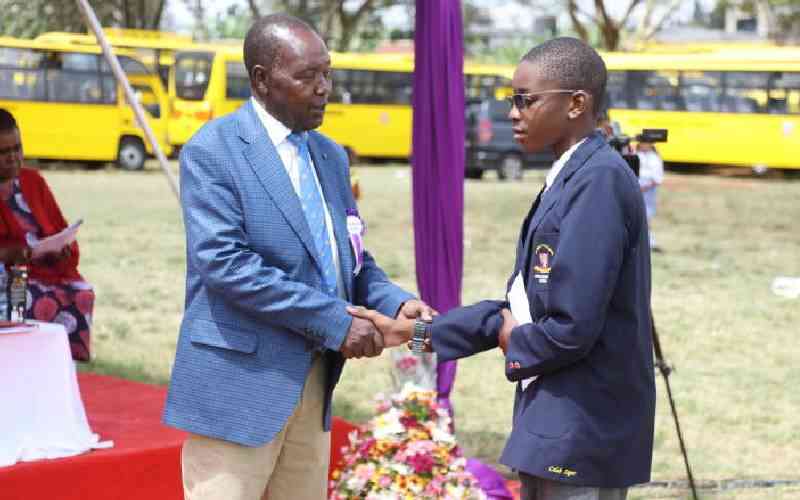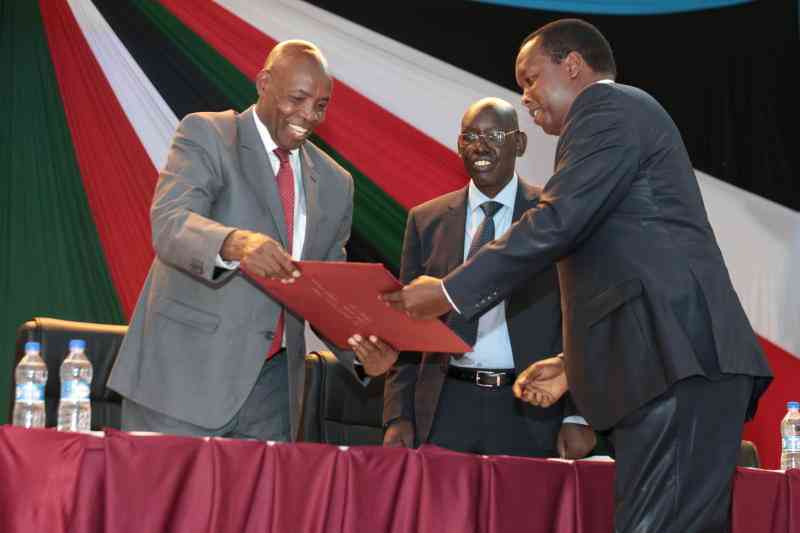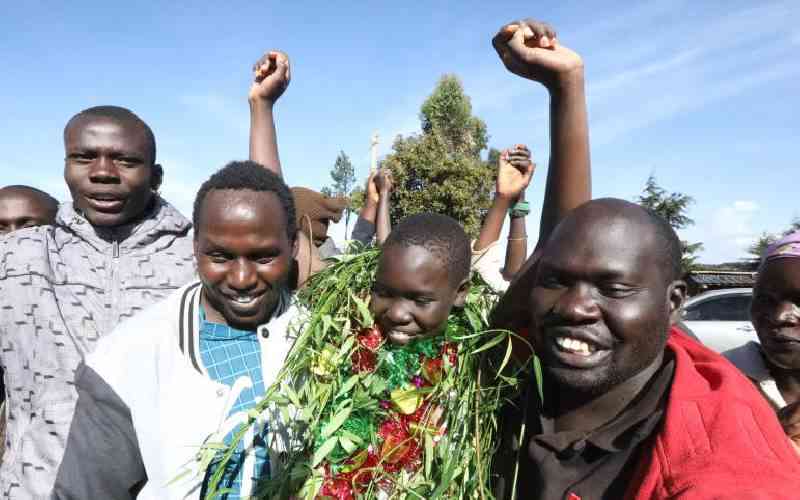 |
|
Education Minister Mutula Kilonzo (L) during the release of 2012 KCPE results at Mitihani House in Nairobi. [Photo: Moses Omusula/Standard] |
By Augustine Oduor
Nairobi, Kenya: More than 100,000 candidates who sat for last year’s Kenya Certificate of Primary Education (KCPE) examinations will miss Form One places in public schools after Monday’s selection process.
This is a major reduction from last year that saw slightly more than twice the number miss places in secondary schools to further their education. But this year, this number will be even smaller after private schools conduct their selection process, a few days after today.
Kenya Private Schools Association officials said currently they can absorb about 76,000 candidates. This means that slightly more than 20,000 candidates will completely miss out on Form One slots in both public and private schools.
However, Education Permanent Secretary George Godia said this would be the last time candidates will completely miss places in secondary schools.
He said his ministry had requested for some Sh7 billion to construct an additional 4,300 classrooms that will accommodate all children from primary schools. Prof Godia said the current transition rate from primary to secondary schools stands at 77 per cent, adding that Kenya may be the first country to attain the Education For All goal by 2014, a year ahead of the set target.
“If we construct the needed additional classrooms then we shall be able to cover for the remaining 23 per cent to clock a 100 per cent transition rate,” he said. Speaking during the release of 2012 KCPE results, Kenya National Examination Council Chief Executive Officer Paul Wasanga said secondary schools were about 7,500.
“If the Government had 22,785 secondary schools, all the 811,930 KCPE candidates would transit to Form One,” he observed.
Godia said private schools had also been asked to expand their facilities to cater for the rising annual enrolment rates.
Expanded schools
In this year’s Form One selection, four candidates who performed well in every district would be selected to join the expanded national schools.
This means that each district will send a candidate to a national school, based on merit.
Education Minister Mutula Kilonzo said the selection of candidates to join Government secondary schools had been reviewed. He said this year the process would be done strictly on merit and not choice of schools by candidates.
He also said it will be based on the proportionate sharing of available places between public and private candidates in a district and on the basis of a district’s candidature.
In addition, Godia said affirmative action will be exercised where need be to ensure all Kenyans get equal chances in the national schools. After the process, the 78 national schools would absorb 15,000 candidates, up from 10,000 last year.
Stay informed. Subscribe to our newsletter
Quota formula
The Government elevated 30 top performing schools last year to national status, in addition to the 48. This created an additional 5,000 spaces. Another 27 schools are set to be elevated to national status soon. Godia said these schools will be called ‘extra county” schools.
“We have been expanding spaces to accommodate more children. What we want Kenyans to know is that national schools are not just about marks. They are also about the face of Kenya,” said Godia.
Last year, about 5,396 boys and 4,886 girls were selected to join national schools that were only 48 then. “There are some schools that have a lot of space for expansion. Once we get the money we shall empower them to expand and by this we shall be able to accommodate all the children in secondary schools,” he said.
After selection of the four candidates per district, the district quota will then be applied to fill up the remaining slots purely on merit. To get the district quota, the ministry divided the enrolment of children per district by gender by the total national candidature for that gender.
“This means that some districts will get more spaces depending on the enrolment. The more the candidates per district the many places they will get based on merit,” he said.
Admissions to county schools will be done at the ratio of 40:40:20. This means 40 per cent to be taken nationally, another 40 per cent from within the county and 20 per cent from the district hosting the school.
The district hosting ‘extra county’ schools will receive a share of the 40 per cent for the county share in addition to its of 20 per cent allocation. Candidates selected to county schools will be admitted to provincial boarding secondary schools.
And here candidates will be selected on the basis of the KCPE candidature in each district within the county. And those selected to join district schools shall be admitted to the current day schools and the former provincial schools with a day’s wing.
Kepsa told The Standard yesterday that they had held fruitful meetings with the Ministry of Education and noted that they are satisfied by the revised formula.
“What we have been fighting for is finally realised. There will be no discrimination of any candidates this time,” said Kepsa Chief Executive Officer Peter Ndoro.
Assessment
He said the formula takes note of the disadvantaged, the marginalised and that all children will get an equal chance to get access to education.
“We have agreed with private schools to expand access, deal with equity and provide quality education. And this is based on the Constitution that all Kenyan children are the same,” said Godia.
He, however, said the few children who will miss Form One places after the completed selection will get chance in polytechnics and other technical institutions.
He said under the Kenya National Examination Act 2012, there would be more focus on assessment evaluation only to help determine a child’s capability.
“Examinations will not be an element of selection. Schools will have roles to play in child’s knowledge acquisition, development of the total human being (to include co-curricular activities) and the inculcation of appropriate values,” he said.
He said private schools have also been urged to shift focus from examinations to also factor in the development of the total child.
 The Standard Group Plc is a
multi-media organization with investments in media platforms spanning newspaper
print operations, television, radio broadcasting, digital and online services. The
Standard Group is recognized as a leading multi-media house in Kenya with a key
influence in matters of national and international interest.
The Standard Group Plc is a
multi-media organization with investments in media platforms spanning newspaper
print operations, television, radio broadcasting, digital and online services. The
Standard Group is recognized as a leading multi-media house in Kenya with a key
influence in matters of national and international interest.
 The Standard Group Plc is a
multi-media organization with investments in media platforms spanning newspaper
print operations, television, radio broadcasting, digital and online services. The
Standard Group is recognized as a leading multi-media house in Kenya with a key
influence in matters of national and international interest.
The Standard Group Plc is a
multi-media organization with investments in media platforms spanning newspaper
print operations, television, radio broadcasting, digital and online services. The
Standard Group is recognized as a leading multi-media house in Kenya with a key
influence in matters of national and international interest.









